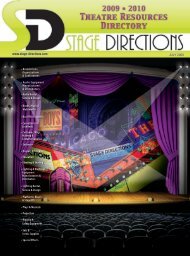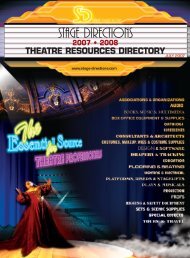Download a PDF - Stage Directions Magazine
Download a PDF - Stage Directions Magazine
Download a PDF - Stage Directions Magazine
- No tags were found...
Create successful ePaper yourself
Turn your PDF publications into a flip-book with our unique Google optimized e-Paper software.
TD Talk|By Dave McGinnisThose Who Do, Teach…SometimesThinking of moving into academic life?Make sure, my friend. Make sure.One of my grad school mentorsonce told me — along with agaggle of other grad students —that the odds pointed directly to each andevery one of us teaching at some point oranother, even if we didn’t see it or wantit. Most people I have known have foundacademic life tolerable, if not enjoyable…myself included. But a friend of mine —who works in lighting design — took ajob working at a university to make endsmeet, and he ran screaming at the firstopportunity. This month, I shall attemptthe impossible — to debate with myselfon an issue I’ve already decided.1. The ConsFirst, the academy requires other dutiesbesides those that immediately cometo mind. Working in a university settingrequires membership on this committeeor that, faculty meetings, professionaldevelopment workshops, academic conferences,teaching of classes, numerousincidental duties and, of course, the workwith which we are already familiar. All ofthese things can achieve balance, but forthose who refuse to allow anything to“get in the way,” having two meetings andthree classes on the same afternoon thatyou planned to get the final stages of yourset erected could dampen your spirits.Second, while exceptions do exist, thegeneral wisdom dictates that your budgetat a university theatre program willnever compete with that of a LORT theatre,or even a non-LORT regional house.The university TD’s job, then, requires notthat we ask for more budget, but that wemake what we have work. (It should benoted here that, for those who read lastmonth’s installment, some of us do NOTconsider this a con.)Finally, university professors do notgenerally achieve fame. Of course, theoccasional anomaly reaches a modicumof name recognition outside of academiccircles, but most of us simply do a goodjob for neither the fame nor the fortune. Itend to like this con because it separatesthose of us who wish to be here fromthose who simply feel that they mustendure it to pay the rent.2. The ProsI would have to state that thenumber one reason to pursue academicemployment labels itself “jobsecurity.” Aside from the occasionaldenial of tenure, academic institutionsoffer far superior job securitythan that afforded by the gig-to-giglifestyle. Academics retain the luxuryof consistent pay at regular intervals,while giggers retain the possibilityof greater recognition and financialgain, though at a greater risk. (Note,though, that most institutions preferthat their theatre faculty — techincluded — also keep up some outsidework to stay current, so your gigcareer need not go down the drain.)This financial stability offers some— SOME — protection from financialstraits, such as those the world suffersat the moment. Of course, given time,financial woes affect us all, but thoseon salaries at schools have a bit morecushioning (hence, time) before theyfind themselves on their duffs.Finally, universities also grant theiremployees some room to experiment.Ever had an idea you weren’t willing totry in front of an audience its first timeout? See if you can garner some timeand space on campus to bench test itbefore running it through the performativepaces. On a related note, collegesand universities tend to understandthat students produce your shows, asopposed to hardened pros. While onenever wishes to stage more than oneturkey every… I don’t know… lifetime,at least universities forgive a bit moreeasily. (Another note: Not every institutiondoes, so tread lightly and always doyour best, as if that should even needto be said.)The college environment canentice even the best of us away fromthe feast-or-famine lifestyle we knowso well, but to simply use it as a safezone cheapens both your experienceand that of your students. In the end,the experience belongs to them, sogive them their due by making certainthat university theatre truly calls you,not entices. Of course, this comesfrom one man’s experience. I’d love tohear what others have gone through,so send me a message at dmcginnis@stage-directions.com.www.stage-directions.com • December 2008 39
















